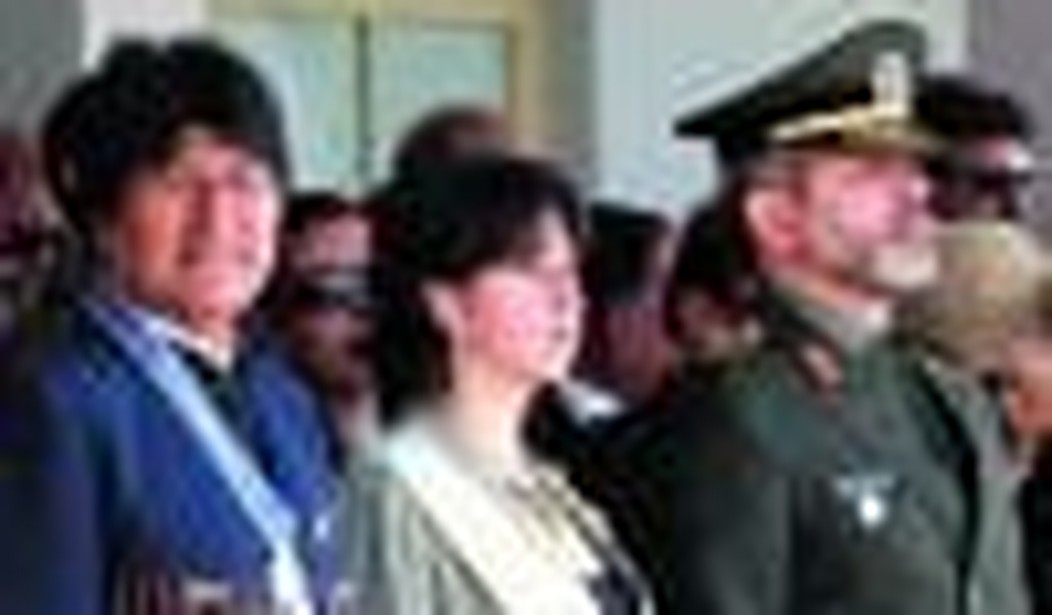Sometimes governments get caught doing something so stupid that as hard as they try, they can’t sweep it under the rug. This was the situation in Bolivia in relation to the recent visit to Bolivia by the controversial Ahmad Vahidi, Iran’s defense minister. Vahidi has been wanted by Interpol since 2009 for being one of the masterminds of the AMIA bombing. AMIA (Argentine Israelite Mutual Association) was bombed on the morning of July 18, 1994, causing the deaths of 85 innocent people (including six Bolivians) and wounding over 300.
Bolivia and its ideological allies, Venezuela, Cuba, Ecuador, and Nicaragua, have been busily making friends with the Iranian government for some time now. Vahidi was invited by the Bolivian government to inaugurate the Escuela de Defensa de los Ejércitos de la ALBA (Alianza Bolivariana para los Pueblos de América) [The School of Defense of the Armies of the Bolivarian Alliance for the People of the Américas]. ALBA supposedly was formed in response to other organizations where participation by Latin American countries with close ties to the U.S. predominates.
The circumstances surrounding Vahidi’s visit are not clear. What is clear is that he was officially invited by the Bolivian government to attend two functions including the defense school’s inauguration. However, when he arrived in Bolivia, the Argentine prosecutor of the AMIA bombing, Alberto Nisman, contacted the head of Bolivian Interpol in La Paz, Coronel Andrés Zapata, to complain about Vahidi’s presence in Bolivia. Cnl. Zapata said that he couldn’t take action until he clarified that the Interpol warrant was current. Vahidi, who appeared on the morning of May 31 at the first official event, stood between President Evo Morales and Bolivian Minister of Defense María Cecilia Chacon. However, Vahidi missed the actual inauguration that afternoon because he was on a plane back to Iran.
The official Bolivian version is that Foreign Minister David Choquehuanca was informed that Vahidi was wanted by Interpol and after reviewing the situation immediately expelled Vahidi from the country and apologized profusely to Argentine Foreign Minister Héctor Timmerman. However, recent information given by Bolivian Minister of Justice Nilda Copa shows that Bolivia did not expel anyone. Vahidi got an order from Tehran to return immediately to his own country.
The fact remains that if Bolivia knew about the Interpol warrant for Vahidi, it was bound by international law to detain him. Bolivia violated international law not only because it officially invited a wanted criminal to Bolivia, but also because once it knew of the warrant it did not immediately detain Vahidi. According to the minister of justice and other government officials, they did not know. For Guillermo Borger, the president of AMIA, ”… as worrisome as the presence of Vahidi in Bolivia, is the fact that the Bolivian government would say that they didn’t know who Vahidi was.”
Initially, Argentine President Cristina Fernández and Foreign Minister Héctor Timmerman strongly condemned Vahidi’s visit and canceled upcoming meetings with Evo Morales. However, during the past week their response has mellowed and meetings between the two presidents have been rescheduled for June 30. Argentina and Bolivia have strong economic ties, as Bolivia is one of the main providers of natural gas to energy stressed Argentina. Worse yet, there are reports that Iran is asking the Argentine government to cool down the bombing investigation in return for stronger economic relations between the two countries.
Not only international law but Bolivian law has been violated. According to the new Bolivian transparency laws, this omission can be interpreted as incumplimiento de funciones. Evo Morales, whose MAS party is involved with the detention or suspension of almost all opposition governors through legal proceedings, could be charged on these grounds.
Bolivia’s ongoing relations with Iran are being scrutinized by the foreign community. Israeli sources have documented deposits of uranium in Bolivia and have speculated that this is another reason for the growing ties between the two countries. Vahidi is one of the main promoters of Iran’s nuclear program as well as a strong proponent of the development of vectorial nuclear arms systems. Considering this, it is extremely dangerous that Vahidi has offered military support to Bolivia.
Bolivia currently has very tense relations with Chile, due to the fact that Chile took away Bolivia’s sovereign access to the Pacific Ocean in the 1879 war. Bolivia is demanding that the OAS rule on this issue. However, Bolivia has started to use much more aggressive and threatening language recently.
There is continued international pressure on Evo Morales to clarify events surrounding Vahidi’s Bolivian visit . There is an important initiative of DAIA (Delegation of Israelite Associations of Argentina) which will be presented in the next OAS (Organization of American States) meeting. The world might do well to remember Edmund Burke: “All that is necessary for the triumph of evil is that good men do nothing.”









Join the conversation as a VIP Member